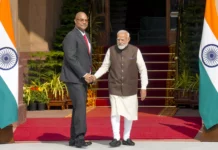 NEW DELHI: Amid demands for greater transparency in appointment of judges to higher judiciary, government today said it is working on a proposal to put in place a new system to change the present mechanism where a collegium of judges has a larger say in such decisions.
NEW DELHI: Amid demands for greater transparency in appointment of judges to higher judiciary, government today said it is working on a proposal to put in place a new system to change the present mechanism where a collegium of judges has a larger say in such decisions.
Law Minister Ashwani Kumar said there was a “large political consensus” to put in place the alternative mechanism.
Under the present Collegium system, the executive has no say in appointments of judges of the Supreme Court and the High Courts as the recommendations of the Collegium are final and binding on the government.
“There seems to be a large political consensus on the need for having an alternative mechanism…principle of it is, may be an alternative system for appointment which ensures greater transparency and better inputs to ensure that the best are selected to judiciary. It is still under consideration,” Kumar told reporters here.
He said though the proposal was still going several changes, the proposed National Judicial Commission could be headed by the Chief Justice of India.
In reply to a poser, he refused to say whether the new body would have the Prime Minister or the Leader of the Opposition as its members. One of the initial drafts is understood to have suggested that the PM and the Leader of the Opposition in the Lok Sabha be part of the Commission.
“There has been a view that we could consider that the collegium system has had its utility…whatever is required will be done and if we can do it we shall do it. Otherwise, we’ll see what is the best way possible,” the minister said, noting that the move might entail a Constitutional amendment which needs the backing of two-thirds members of a particular House of Parliament. . India may be among the few countries in the world where judges appoint themselves. This practice started after 1993, replacing the system of government picking judges for higher judiciary comprising Supreme Court and 21 High Courts.
The move to set aside the 1993 Supreme Court judgment which led to the Collegium system will require a Constitutional amendment.
The last effort to replace the collegium system in 2003 could not succeed. The then NDA government introduced a Constitution Amendment Bill, but the Lok Sabha was dissolved when the bill was before a Standing Committee.
A vision statement of the Law Ministry issued in October, 2009 had said the Collegium system was hindering the efforts to end shortage of judges and suggested involvement of executive and legislature to hunt for the best talent.
Replying to a volley of questions on a controversial clause in the Judicial Standards and Accountability Bill which seeks to debars judges from making verbal comments against any constitutional authority in open courts, Kumar insisted it was not a “gag order”.
“I would like to very categorically dispel that nothing in the Bill should be treated as a gag order. We hope to bring in a provision which will only reiterate that the Supreme Court has already stated in a number of its judgments which states that courts must refrain from making observations against anyone where such observations are not strictly necessary for the decision of the case before the court,” he said.
A few days ago, Kumar had said that the government has decided to retain the clause “in some form.”
The Bill was passed in the Lok Sabha during the Budget Session this year amid din over Telangana. Following stiff opposition by eminent jurists and the higher judiciary, government had agreed to have a relook at the clause even as it decided against tabling it in Rajya Sabha in the Monsoon session.
The Opposition too had demanded amending the clause.
It allows the citizens to complain against corrupt judges, but has been facing criticism for this provision which jurists says would “virtually gag” the judges in open courts.
The clause prohibits judges from making “unwarranted comments against conduct of any constitutional or statutory authority or statutory bodies or statutory institutions or any chairperson or member or officer thereof, or on the matters which are pending or likely to arise for judicial determination.”
He said the changes in the Bill, including the controversial clause, would be finalized shortly and the Law Ministry is likely to move a note before the Cabinet in the next few days.
He said the changes would help dislodge certain misconceptions regarding the bill and it could be brought in the ongoing Winter session of Parliament.
Kumar noted that not only constitutional bodies, the clause would cover all people against whom unwarranted comments are made.
In reply to a question on suggestions made by some jurists that the Chief Justice of a particular court should ensure that no unnecessary observations are made, he said “You have not seen the (fresh) bill,” indicating that the issue has been addressed.
Then Chief Justice of India S H Kapadia, addressing a Supreme Court function on Independence Day this year, had cautioned that “the government may make law for making judges accountable. We are not afraid of that. But it should not tinker with the very constitutional principle of judicial independence.”
Referring to the issue of improving the justice delivery system, Kumar said the Gram Nyayalaya Act, 2008 which seeks to provide courts at block level, could not be implemented vigorously.
He has written separately to the Chief Justices of the High Courts as well as the Chief Ministers to deploy people, including former judicial magistrates, to man such courts.
Kumar said the CMs have been asked to ensure that prosecutors and policemen take these courts seriously and has requested them to depute officials there.
He said to ease out pressure on courts, he was working on a proposal where people can settle their cheque bounce cases out of court through arbitration. At present, nearly 40 lakh such cases are pending in courts.
On the delay in the passage of a bill which seeks to create commercial benches in High Courts to deal with high value commercial cases, the minister said the issue could be referred to the Law Commission but a final decision was yet to be taken.
A Rajya Sabha select committee had given its report on the bill two years ago but the government is yet to take a call on the issue. -PTI






